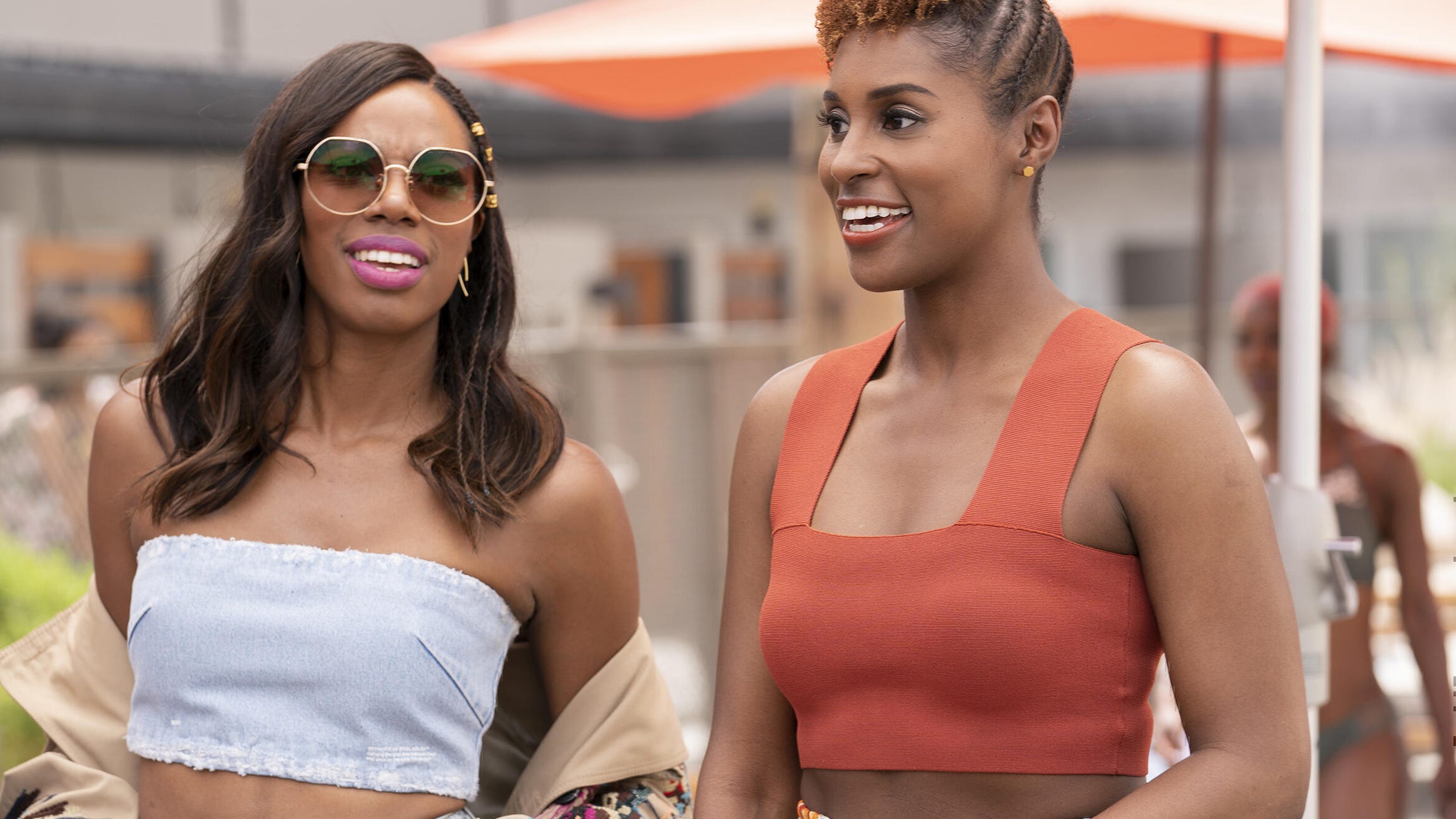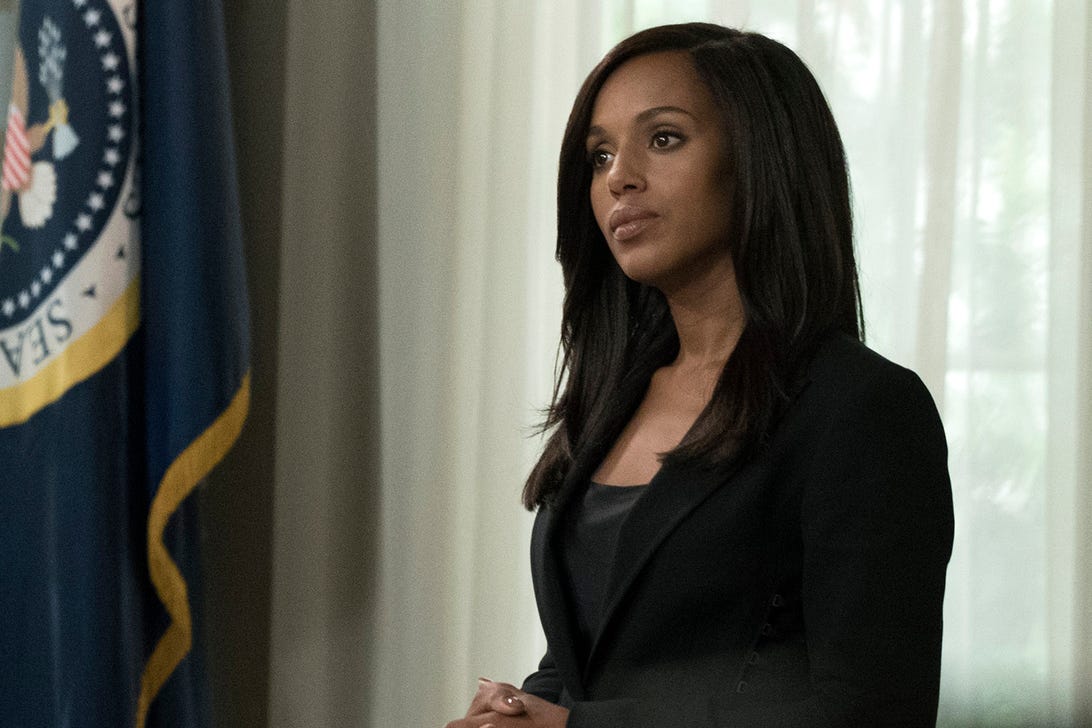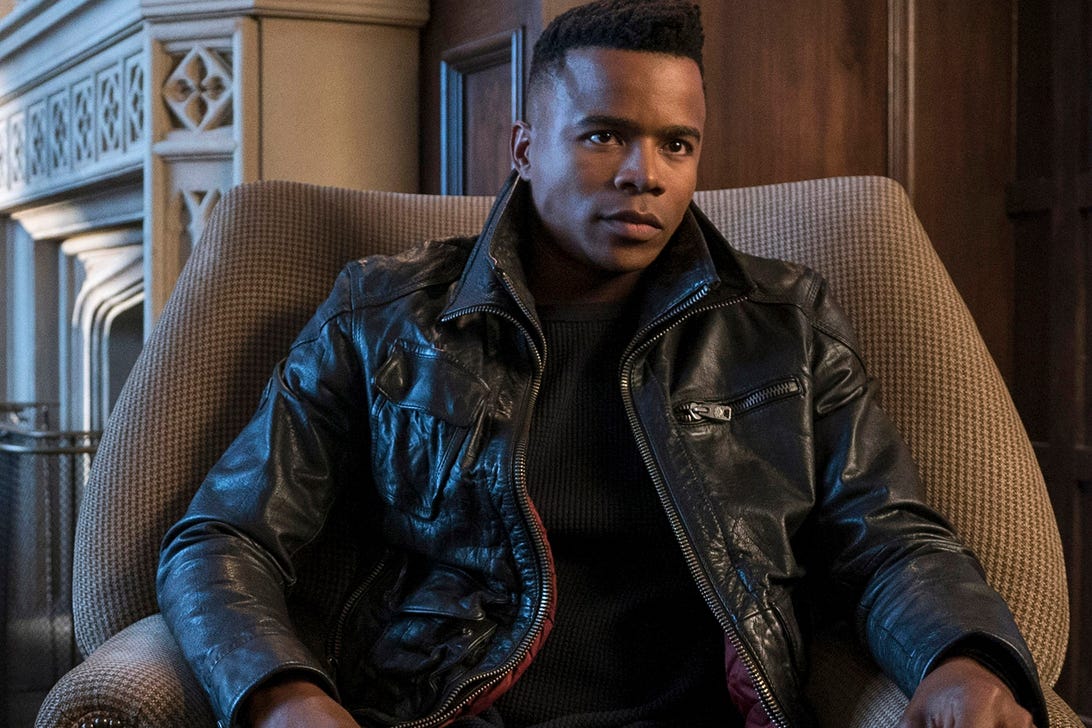
When Black Cracks: The Agony And Ecstasy Of Strong Black Characters With Depression
The representation of black people struggling with trauma on television has often let me down. But now, a shift in the way we are portrayed has slowly began to lift me up.
Outside of my tiny split level home in Baltimore, teenage boys played basketball, girls wearing their newest Baby Phat coats (despite the summer heat) sashayed by, and an ice-cream truck sat on the corner. Everyone surrounded our home because to the other inhabitants of Lucerne Road, this home and this family was an idyllic nucleus for the neighborhood. However, within the four walls of the 8413 there was a storm brewing. My sister had just run away, and not for the first time. My mother and father had not yet mastered how to displace the weight of my sister's pain, so in turn, they carried her anger and viciously directed it toward each other. And then there was me, a 7-year-old girl who stealthily hid in my room and drowned out the chaos of my home by turning to my omniscient babysitter: the television.
It was the late 90s, my box television had a bunny ear antenna and I only saw one channel clearly, "Nick at Night," which played reruns of old shows and shows in syndication. My jams were The Wonder Years and The Fresh Prince of Bel Air. While I loved them both as American comedies, the boundless space given to the white characters in The Wonder Years to navigate their pain and suffering immediately imprinted on my adolescent brain, which was searching for any clue on how to survive my own home. Kevin Arnold's parents fought just like mine, his sister was living in her own world just as mine was, and he witnesses it all often from the shadowy corners of his home. However, all the while watching the Arnolds and their considerable similarities to my family, I knew there was a world of difference between us.
When I watched Fresh Prince, I watched my people be rich, over the top, and successful. The show, which packed more humor because it was a sitcom, also dealt with painful moments -- only these moments were presented with immediate relief or as a very special episode, meaning it existed outside the status quo of the show. The moment everyone remembers is "the monologue" wherein Will Smith delivers an emotional speech about how he doesn't need his father because his father showed him how he doesn't need him. This feeling of abandonment, although I was unaware at the time, was the sentiment I experienced as my parents were in the midst of my sister's drama. I felt emotionally abandoned. And while it was the first time I saw someone from my own community address the issues, it was a small moment, in one episode that -- albeit powerful --disappeared and was not given space within the season's arc to linger. From this point on, I knew when I watched the show I wasn't watching my family, rather I was peeking in on the superhuman distant cousins I'd never meet in real life.
This representation of black people in media--the image our community has long fought for--is the very portrayal that forced me to believe strength and success were superior to vulnerability. Families like the Huxtables, the Banks showed black people can be strong and depicted in a positive light, free from stereotypes and negativity. However, the influence of these portrayals diminished the opportunity for me to see black people dealing with trauma and mental illness on television.
As a result, the way I presented myself to my peers was void of the raw trauma I was internally battling. My family moved from Baltimore to a predominantly white, conservative, rural area in Maryland. Just as the Huxtables permeated through white and black America because it was the version of us we wanted to portray and the version of us they wanted us to be, I traversed this white space as easily digestible as possible. I spoke, without hesitation, as a representative for my entire community and when I'd feel the urge to emotionally succumb to my depression, I'd push through and laugh it off like the button of Fresh Prince episode.
I was peeking in on the superhuman distant cousins I'd never meet in real life.
By the time I was a freshman in college, the "bounce-back and persist" mentality has sunk inn so deeply, I didn't know there were other options. I was quickly told by the professors in my acting program that I would have to get used to playing strong, alpha, women with undeterred points of view. I remember thinking to myself how am I supposed to act with such resilience when I feel everything but. I was devastated by my first traumatic breakup, and going through one of the toughest bouts of depression I'd ever experienced. I was heavily medicated, losing weight, and had a constant salty track on my face from my tears. While I see many resilient women of color who answer the silent call to save the world, even though the world has done little for them, I also notice the world is slow to recognize when we are in need of a little saving ourselves. Nevertheless, I took the words of my instructors as scripture and prepared myself for a future of portraying women devoid of fragility, which inevitably crept into my life. Even if I was on the verge of tears and felt like I was surrounded by nothing but darkness, I would buck up and plow through the day, hoping people would marvel and say how does she do it? As a result, my tough exterior -- which is actually only as durable as an M&M candy-coated casing -- was the image I portrayed to the world, leaving me to navigate all of my internal conflicts on my own. In the end, this only worsened my depression. At one point, I even pondered the concept of suicide, for I had nothing in my life but insurmountable loneliness.
Only at 20, when Shonda Rhimes exploded onto the scene, did I see black, female, leads in a white world who didn't always have their shit together despite the immaculate image they presented professionally. As soon as Olivia Pope (Kerry Washington)--with her regal ensembles, perfectly blown out hair, and quippy lines--graced my screen in the first episode of Scandal, I knew that television would never be the same. Every week, I'd watch as she'd handle the toughest situations in the D.C. swamp all while balancing several intimate sexual affairs, the biggest with the married President of the United States. Despite dealing with the constant rejection that came with loving a man who wouldn't commit to her, living under the terrifying shadow of her murderous father, and even being kidnapped and held captive, Olivia Pope rarely sweated out her edges.

Kerry Washington, Scandal
Richard Cartwright, ABCHowever, when Pope was safe in the comfort of her home, we saw a different image. We saw a woman who did not have it all together and fantasized about a simple life in a Vermont cabin, where she could rock a wash-and-go and never have to mutter the words "it's handled" again. Pope's second and truest persona hit me like a puddle of muddy water splashed up from a speeding car. I saw the very person I ascribed to be, yet, within the show, this person was strictly reserved for fantastical flash-forwards, removed from the real storyline and the real world. Sure, this dichotomy made for excellent television, but it also gave me what I'd like to call the opposite of an "A-Ha Moment." I actively assumed that Pope's uncompromised life in the cabin was a dream because she didn't actually want to live a life of ease. This led me believe that for a black woman to truly be happy, she must be on a never-ending quest to the top. While I admired Pope's aptitude to publicly thrive in the face of adversity, this did nothing but put more pressure on me to bury my own suffering and catwalk through the world with my chin up, in order to reach the promised land of power.
Throughout any situation that made me feel weak and vulnerable, I'd learned to push that pain so deep, that I didn't feel like I was pretending to put on a happy face, I was just doing it. While this solution worked in the short term, it ultimately created an overwhelming weight in my chest. I'd carried my depression around like a secret, and eventually it ate at me until I felt like I was suffocating with nowhere to turn. After all TV had shown me that, emotionally at least, black does crack, but what next?
I wasn't looking for help. And neither were the pop culture standard bearers before me, even on shows that forced mental health resources on its characters.

Marque Richardson, Dear White People
Saeed Adyani/Netflix
In the second season of Dear White People, there's an episode which centers around a group of black students attending an Ivy League school, featured Reggie (Marque Richardson)--who had just walked away from staring down the barrel of a campus security officer's gun--and his unsurprising resistance to mandatory therapy. In his sessions, Reggie finds space to talk about everything but his PTSD. In one instance, he shrewdly suggests the security officer who took out his gun should be the one in therapy, even though we've seen him struggle with nightmarish flashbacks stemming from his trauma.
His struggle to accept the help being offered leads Reggie to take part in an on-campus documentary where he gets to lay out the macro and microaggressions he regularly faces and how he will now demand white people to view him. Sure Reggie found catharsis in his own way, but for many of us, the assistance of a professional is the only way we'll truly grow through our pain.
Unlike Reggie, my anxiety and depression eventually became so crippling, I couldn't get out of bed until 10 minutes before I had to leave for work, and immediately upon returning home, I made a mad dash to a bottle of wine, like lost traveler to a cold spring. I had nowhere to look to for a blueprint of what the actual process of getting my life together would or could look like. In carrying me all this way, television gave me benchmarks for black womanhood that still set me back and pushed me into isolation. Without a community open to discussions of mental health to turn to, and no potential preview of what was to come, finding a therapist felt like stepping off a ledge blindly and plummeting into a space where who I was and who I could be was so nebulous I couldn't even fathom it.
Ironically, just over a year into my individual therapy sessions, a little show calledInsecure premiered. In the second season, Molly (Yvonne Orji), a successful, smart, and funny best friend to the show's lead, begins to explore the world of therapy. Unlike the way in which I watched other black shows, I thought about Insecure and Molly differently. Maybe it's just personal growth, maybe it's age, maybe it's the confluence of the two, but in Molly I don't see or need a standard bearer. In fact, it's the exact opposite: Molly's resistance to the work and inability to identify her own struggles are a stark reminder of who I don't want to be.

Yvonne Orji as Molly, Insecure
HBONow, I go to group therapy once a week. In my sessions, I sometimes find myself channeling a bit of Molly's doubt of the process, and anyone who has seen a therapist knows this is the most counterproductive headspace to operate from whilst exploring your mental health. I, like Molly, found that I often possess the accoutrements of someone who has it all but still struggles finding love (both from others and within myself). However, her journey on the show has helped me to work past my assumptions that needing therapy is something shameful. When I first sat on the plushy, non-suggestive couch across from my therapist, I treated my sessions like prescriptive medication, something to be hidden and only used until my ailment disappeared. There were moments when I'd divulge truths about life to my therapist--whether it be how I was using my inebriated state as a method of escape, or how I ruined a relationship with a friend or lover with a selfish action--that would make me question how I got into such a messed up place. But then, I began to trust the process and my own work.
Now I view my sessions as a tool. I can look into the scars of my past without telling myself I need to get over it. I can ask for help and be emotionally vulnerable without fear of being viewed as weak or destitute. My life does not mirror the lives of my favorite television characters because they exist in fiction, which I've neglected to tell myself as I grew up. I am my own standard bearer when it comes to holding myself accountable to monitor my distress before it uncontrollably spills out and throws my life into total disarray. As I begin to feel my emotional reservoir fill with depressives and anxiety, I immediately find an outlet to release some of the pain I'm carrying. Sometimes that outlet is as simple as an age old sitcom like Fresh Prince, guaranteed to make me laugh. The difference now is that I don't have to use Will Smith's monologues to express myself.
Because just as Dean Fairbanks of DWP put it, "You've got 99 problems and your head doesn't need to be one."